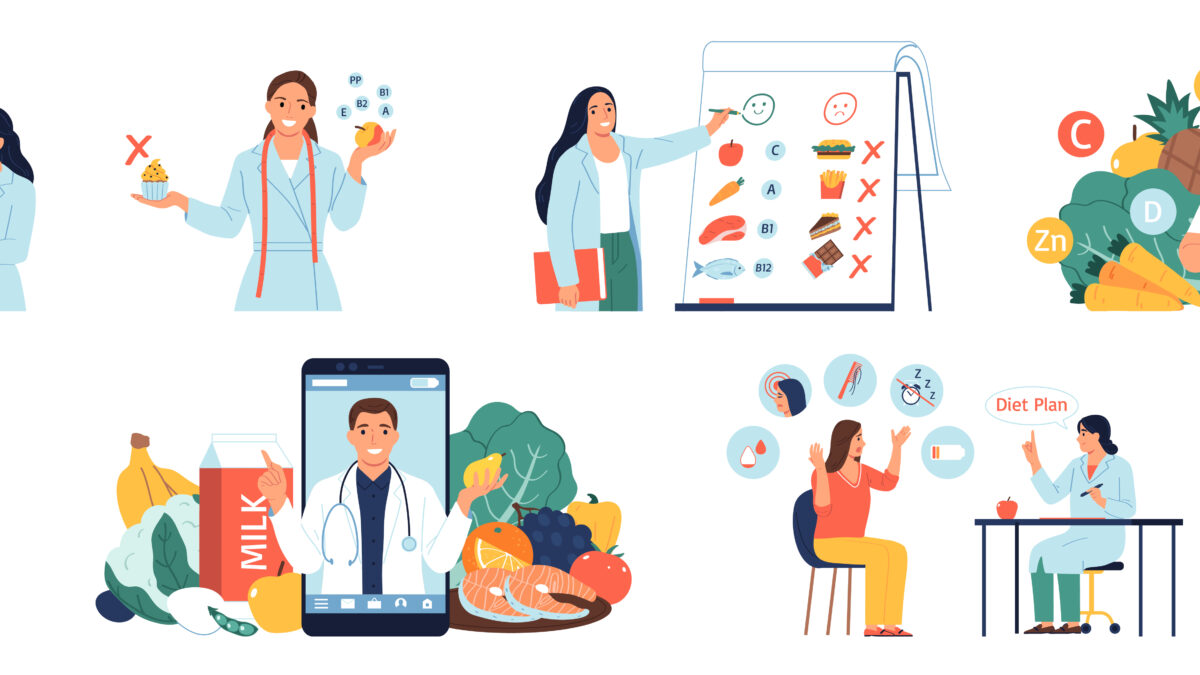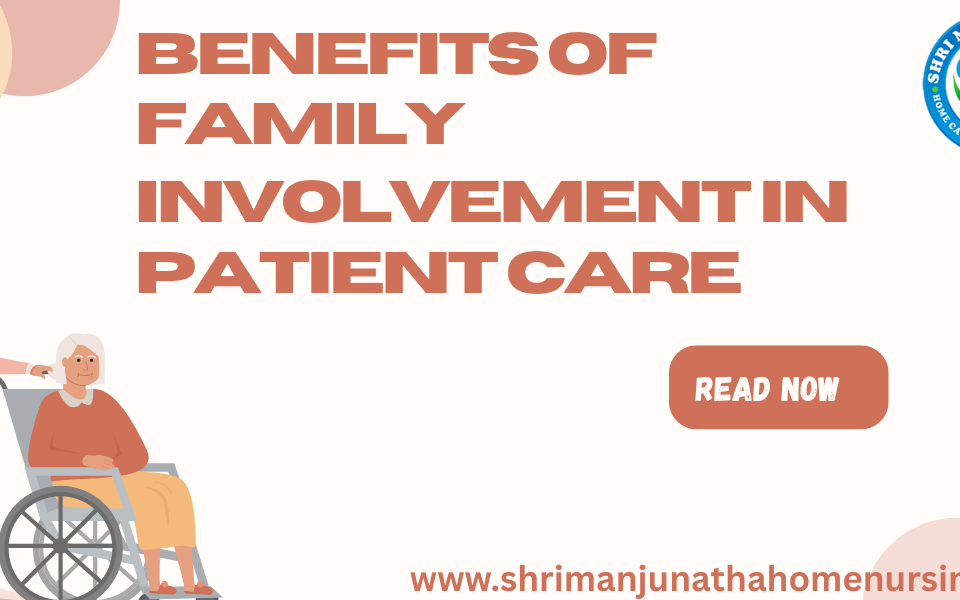The Role of Nutrition in Accelerating Recovery at Home

Simple Tips to Prevent Falls and Injuries at Home
April 22, 2025
Navigating End-of-Life Care: How Home Nursing Supports Families
April 28, 2025Good nutrition is key to helping home care patients heal faster. Whether recovering from surgery, illness, or managing chronic conditions, the right foods boost strength and well-being. At Shri Manjunatha Home Nursing, we support Udupi families in caring for loved ones with expert, compassionate guidance. This blog explains why nutrition matters, which nutrients are essential, and how caregivers can plan healthy meals. Learn simple ways to help your loved one recover at home.
Why Nutrition Matters for Recovery
Healing the Body
Food fuels the body’s ability to repair itself. Protein rebuilds muscles and skin after surgery or injury. Vitamins and minerals fight infections, keeping the immune system strong. Poor nutrition slows healing and raises risks, says the Centers for Disease Control and Prevention. For Udupi families, good nutrition shows love through care.
Boosting Energy and Mood
Proper meals prevent tiredness and lift spirits. Carbohydrates from whole grains give steady energy. Healthy fats support brain health, reducing stress. Recovery can feel overwhelming, but eating well helps patients stay strong. Shri Manjunatha’s care team ensures nutrition is part of every care plan.
Supporting Medications
Some nutrients help medicines work better. For example, vitamin C aids iron absorption, improving energy. A balanced diet reduces side effects like nausea. Caregivers play a big role in this process. Our home nursing services guide families to support recovery effectively.
Key Nutrients for Healing

Protein: The Body’s Builder
Protein repairs tissues and keeps muscles strong. It’s found in chicken, fish, eggs, beans, and nuts. Seniors need more protein to heal, says the World Health Organization. Include it in every meal for best results. Shri Manjunatha’s caregivers plan protein-rich meals for patients.
Vitamins and Minerals: Immune Boosters
Vitamins and minerals protect and repair the body. Vitamin C, in oranges and peppers, speeds wound healing. Vitamin A, from carrots and spinach, supports skin health. Zinc, in nuts and seeds, aids tissue repair, while iron, in leafy greens, boosts oxygen flow. These nutrients are vital for recovery.
Healthy Fats: Fighting Inflammation
Vitamins and minerals protect and repair the body. Vitamin C, in oranges and peppers, speeds wound healing. Vitamin A, from carrots and spinach, supports skin health. Zinc, in nuts and seeds, aids tissue repair, while iron, in leafy greens, boosts oxygen flow. These nutrients are vital for recovery.
Fiber: Keeping Digestion Smooth
Fiber prevents constipation, common in bedridden patients. Whole grains, fruits, and vegetables are rich in fiber. It also helps control blood sugar, important for diabetic patients. Shri Manjunatha’s team designs fiber-rich diets for comfort. This keeps patients feeling their best.
Water: The Hidden Hero
Staying hydrated flushes toxins and prevents dehydration. Aim for 8–10 glasses of water daily, per National Institutes of Health advice. Hydrating foods like watermelon, cucumbers, and soups also help. Caregivers should keep water within reach. Hydration supports every part of recovery.
How Caregivers Can Plan Nutritious Meals

Build Balanced Plates
A healthy meal includes protein, grains, vegetables, and fats. Try grilled chicken, brown rice, and steamed broccoli with olive oil. Fruits like mangoes add vitamins and sweetness. Shri Manjunatha’s nurses help families plan balanced meals. This ensures patients get all the nutrients they need.
Make Food Easy to Eat
Some patients struggle to chew or have small appetites. Soft foods like mashed potatoes, yogurt, or soups are gentle on the stomach. Serve small, frequent meals to avoid overwhelming them. Smoothies with fruit and protein powder are nutrient-packed and easy to sip. These options keep nutrition simple and effective.
Avoid Unhealthy Choices
Processed foods high in sugar or salt harm recovery. Skip packaged snacks and sodas, which can increase inflammation. Homemade meals are healthier and tastier. For Udupi families, traditional dishes like vegetable dal or ragi porridge are great choices. Caregivers can learn recipes through our care consultations.
Keep Hydration Fun
Encourage fluids with variety. Herbal teas, fruit-infused water, or clear broths make drinking enjoyable. A colorful water bottle can remind patients to sip often. Hydration prevents fatigue and aids digestion. Shri Manjunatha’s team shares creative hydration tips with families.
Tailor Meals to Health Needs
Medical conditions require special diets. For diabetes, choose low-sugar foods like whole grains and greens. For heart issues, cut salt and add omega-3-rich fish. A doctor or dietitian can guide these choices. Our services include personalized meal planning for every patient.
Tips for Patients with Low Appetite
Small, Nutrient-Dense Meals
Low appetite is common during recovery. Offer small portions packed with nutrients, like a bowl of lentil soup with spinach. Nut butter on whole-grain toast is another quick option. These foods deliver energy without being heavy. Caregivers can make meals appealing with colorful ingredients.
Add Flavor and Comfort
Tasty food encourages eating. Use mild spices like turmeric or cumin, common in Udupi cuisine, to enhance flavor. Warm dishes like khichdi feel comforting and familiar. Present meals nicely to spark interest. Shri Manjunatha’s caregivers share ideas to boost his appetite.
Involve Family in Meals
Eating together builds connection. Family members can share a meal or chat during eating time. This makes meals a happy moment, not a chore. For Udupi families, this reflects cultural values of togetherness. Our team supports families in creating these moments.
Sample Meal Ideas for Recovery
Breakfast
Oatmeal with almonds, banana slices, and a drizzle of honey. It’s soft, filling, and rich in fiber and protein. Pair with herbal tea for hydration.
Lunch
Grilled fish with quinoa and steamed carrots. Fish provides omega-3s, while carrots add vitamin A. A side of curd adds probiotics for digestion.
Dinner
Vegetable dal with brown rice and sautéed greens. This meal is high in protein and fiber, perfect for healing. Serve with a glass of buttermilk.
Snacks
Fruit smoothies with yogurt and flaxseeds for protein and healthy fats. Hummus with cucumber slices is light and nutrient-dense. These keep energy up between meals.
When to Consider Supplements
Whole foods are best, but supplements can help with deficiencies. For example, a vitamin D pill may support bones if sunlight is limited. Always ask a doctor before starting supplements. Shri Manjunatha’s nurses coordinate with healthcare providers to ensure safe choices. This keeps nutrition balanced and effective.
Conclusion
Nutrition is a powerful way to help home care patients recover—balanced meals with protein, vitamins, and hydration speed healing and boost strength. Caregivers in Udupi can make a difference with simple meal plans and family support. At Shri Manjunatha Home Nursing, we provide expert guidance to ensure your loved one thrives. Contact us today to learn how we can help.
FAQ
What foods help with healing?
Chicken, eggs, oranges, and nuts are rich in protein, vitamin C, and zinc. These speed up tissue repair. Shri Manjunatha’s team plans healing meals.
How do I help a patient with a low appetite?
Serve small, tasty meals like smoothies or soups. Make food colorful and comforting. Our care services include appetite-boosting tips.
Why is hydration important?
Water prevents fatigue and aids digestion, says the NIH. Dehydration slows recovery. Encourage 8–10 glasses daily.
Can supplements replace food?
Whole foods are best for nutrients. Supplements help only if a doctor finds deficiencies. Consult our team for guidance.
What are easy meals for recovery?
Try oatmeal with fruit, vegetable dal with rice, or smoothies. These are nutrient-rich and gentle. Shri Manjunatha offers tailored meal ideas.




